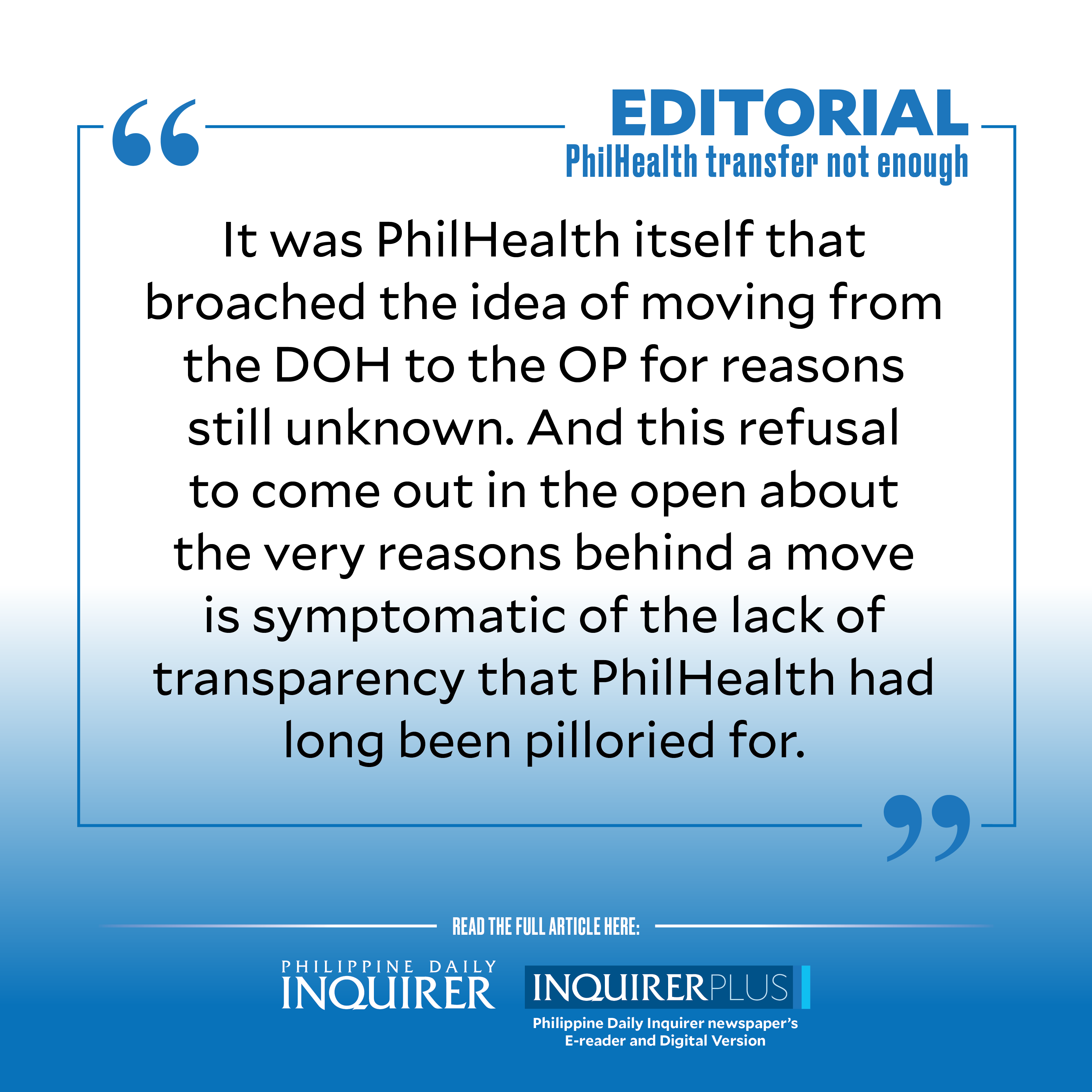PhilHealth transfer not enough
If newly appointed Health Secretary Teodoro Herbosa is to be believed, transferring the supervision of the Philippine Health Insurance Corp. or PhilHealth from the Department of Health (DOH) to the Office of the President (OP) will make its vast operations “more efficient,” thus improving the delivery of vital health-care services to its 55.3 million members.
“It’s a management thing if you want to make something more efficient,” said Herbosa, “If we’re trying to think about this, I think the President wants to have better and more efficient health care financing kasi gusto niyang tutukan (because he wants to focus on it). If you put in the [Office of the] President, mas madaling matutukan (it’s easier to be focused on).”
Article continues after this advertisementAlbay Rep. Joey Salceda, chair of the House ways and means committee, seconds the motion, claiming that the transfer was a “good first step” to solving the perennial and serious problems plaguing PhilHealth, not least of which is pervasive corruption that had caused billions of pesos in hard-earned taxpayer money to go to waste.
During the pandemic, the state-run agency that was created to implement universal health coverage in the Philippines was rocked by charges of P154 billion in missing funds involving a number of its high ranking officials, eventually leading to the resignation of then PhilHealth president and CEO Ricardo Morales.
As if this were not enough of a slap on the face of Filipinos forced to endure the most stringent COVID-19 quarantine restrictions, claims of fund misuse and patent incompetence pushed hospitals around the country and even the Philippine Red Cross to the brink of cutting ties with PhilHealth because they could not claim reimbursements rightfully due them.
Article continues after this advertisementPlus, PhilHealth was hit by allegations of “upcasing” wherein through an elaborate conspiracy, minor respiratory symptoms were passed off as COVID-19 for higher benefit reimbursements, leaving Filipinos already chafing at the lockdowns seething at the audacity to commit these crimes as Filipinos were suffering.
The list of controversies and scandals involving PhilHealth is, indeed, disturbingly long, which then begs the question: Will the transfer really cure the ills that have long hounded PhilHealth, from the string of corruption scandals to the uneven and unequal delivery of vital health-care services, especially to the poor who need them the most?
Sen. Risa Hontiveros certainly does not think so and was aghast that the DOH would even consider relinquishing its responsibility and accountability as the principal national health authority in charge of PhilHealth in favor of Malacañang. She pointed out that under existing laws, “PhilHealth is and should remain attached to DOH for policy coordination and guidance toward the realization of universal health care.”
So why the sudden interest of the OP to exercise authority over PhilHealth, asked Hontiveros.
That suspicions have been raised on the motivations behind such a proposal should not be surprising as the OP already has its hands full to overflowing. Aside from supervising a slew of other major agencies including the National Economic and Development Authority, Bases Conversion and Development Authority, National Commission for Culture and the Arts, President Marcos still concurrently holds the portfolio of the Department of Agriculture that is also underperforming in its task to ensure adequate food supply and going after smuggling.
It was PhilHealth itself that broached the idea of moving from the DOH to the OP for reasons still unknown. And this refusal to come out in the open about the very reasons behind a move is symptomatic of the lack of transparency that PhilHealth had long been pilloried for.
Akbayan Party president Rafaela David pointed out that the transfer could make the agency “vulnerable to vested interests and political pressure, which could undermine its ability to operate independently and make impartial decisions.” Said David: “With less oversight and scrutiny, there is a risk that the agency could become less accountable to the public and ineffective in addressing corruption and other issues that have plagued it in the past.’’
The problems hounding PhilHealth have been laid bare before the public, for instance through whistleblowers who exposed a string of corrupt practices as reported by this paper, and the exhaustive investigations conducted by the Senate. Merely transferring the agency under Malacañang’s supervision without addressing the sources of institutional corruption, inefficiency, and incompetence is tantamount to sweeping the dirt under the rug. And instead of passing the buck to Malacañang, the DOH should do its job of ensuring that all the PhilHealth officers will come up with serious, drastic reforms and will be accountable in fulfilling the agency’s mandate.

















